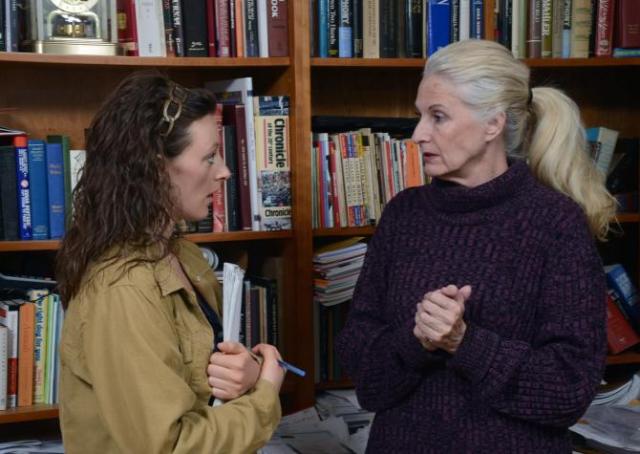

There are three story-tellers in Collected Stories.Ruth, a long successful writer of short fiction, now mainly teaches graduate students, like Lisa, who aspire to write good stories. Professing deep admiration for Ruth’s writing and teaching, a panting Lisa snags her as a mentor and then becomes her personal assistant. During their six-year relationship, playwright Donald Margulies poses dilemmas -- one of ethical import -- that arise from the give-and-take between teacher and student.
At a typical first lesson, Ruth obviously likes talking of what she likes or not and why. She orders Lisa not to tell about a story but write it lest it dissipate in talk. Autobiography is fine to use. Spare the adjectives. Don’t make sentences too long. Everything in a story “must have a reason.” Lisa absorbs the advice about using one’s life experiences and agonizes about hers with her father and parental expectations.
Before long, Lisa is obeying Ruth’s dictum: “If you have a story to tell -- do it.” Even if it means “going for the jugular.” When Ruth returns from an appearance before Congress, she admits she “exaggerated” material as needed “for a good story.” She’s upset, though, at Lisa’s work in the apartment, straightening up piles of things Ruth wanted “as is”. Intimidated, Lisa needs reassurance to stay. She has enough to tell Ruth she’s publishing a story in a journal Ruth thought she wasn’t ready for yet.
Because of their bond, Lisa persuades Ruth to tell about her youthful affair with the aging alcoholic poet Delmore Schwartz. It’s a high point not only of Ruth’s life but of Margulies’ drama. Sara Morsey lets us see her reliving her youth as virginal Ruth, come to the big city to be a poet and getting hooked up to a celebrated but declining one. But she’s never written about it: “Some things you don’t touch.”
Lisa pursues her ambition and revels in positive criticism of her stories that get published in a book. Her hair, make-up, clothes get more sophisticated as her visits to now-mother-like Ruth happen less. Finally, she will publish a novel, appropriating Ruth’s love story.
At a preview reading, Lisa begins with another borrowing -- from a poem by Edna St. Vincent Millay. “That chill is in the air./This joy, I know,/Will soon be under snow.” It’s also an apt introduction to her final confrontation with Ruth.
Ruth is home ill. She’s obviously sliding into finality of self as well as professional opportunities and repute. She scores Lisa for stealing her life, the words she spoke, even her Jewish point of view. Morsey shows her jealousy of the time Lisa has left.
Margulies has Lisa leave the fray . . . but as ultimate winner or loser? Director Howard Millman wisely also lets us decide, though either he or Kim Stephenson interpret Lisa from the start as being over-concerned with herself. Despite Stephenson’s Lisa being too much on a high from the start, she handles some difficult scenes -- like Ruth’s grumbling over little things and a precious attitude in her reading from her novel -- tellingly. It’s a tough role, since Lisa doesn’t seem to have much humane motivation but only ambition. Morsey’s Ruth, by contrast, changes from mentor to mother to vulnerable victim. It’s the kind of superb performance typically seen at The Banyan and here nicely handled by Millman. Ross Boehringer deserves praise for costumes that tell not only character and changing times but also the two women’s situations over time. Lights and sound are handled well, particularly the jazzy scene changes. I do not, however, feel the set has all books accessible. Nor are any scattered along with papers and other “desk stuff” common to a professor and writer. The dining table is strangely far from a kitchen that seems to be in the back of the house; it should have been to a side nearby. Everything looks like a set, not a setting – jarring, therefore, in such a good overall production.
